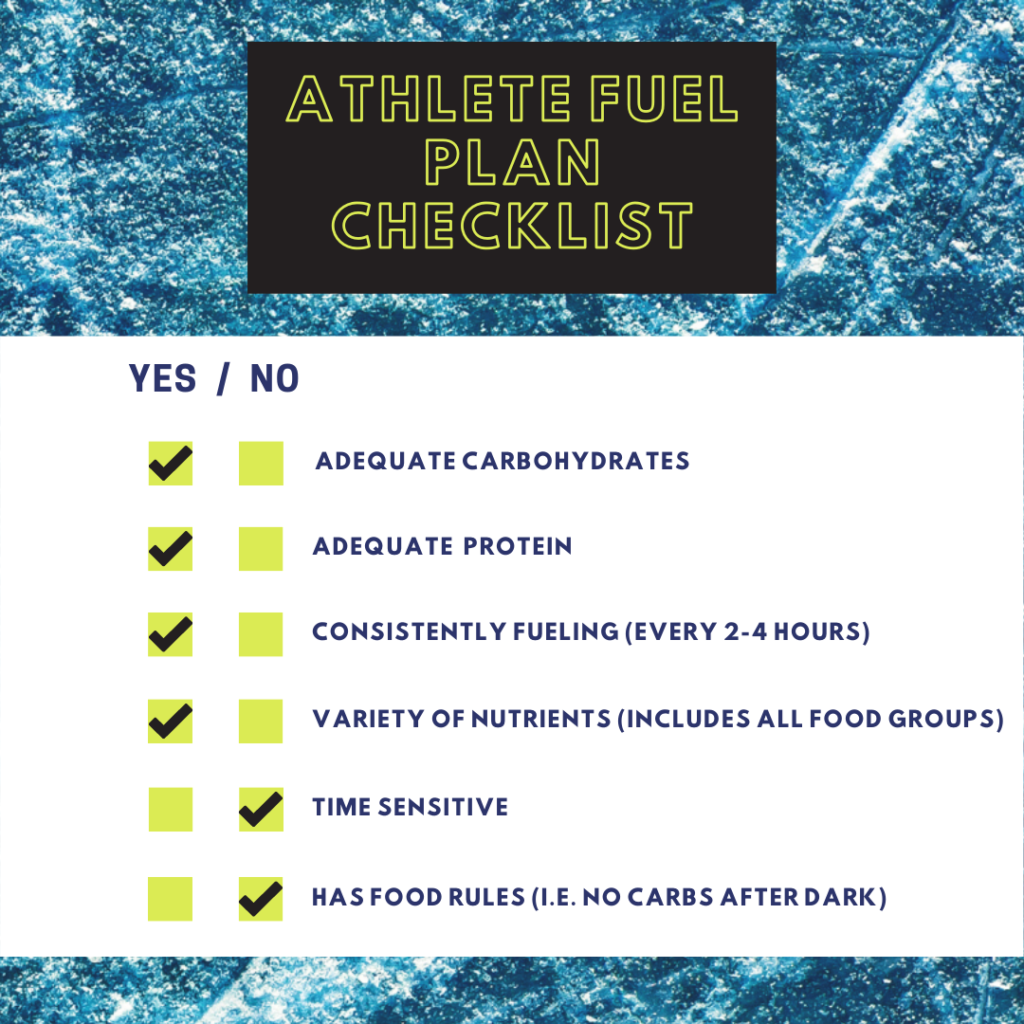Fueling in the New Year
January 3, 2021
Wouldn’t it be nice if you had a system for evaluating diets and trends to know if they are worth your time or not?
Every year, without fail, new diets emerge and old diets are repackaged and marketed to us in the hopes that if we jump on the bandwagon, we will meet our ______ goals (insert: weight loss; performance; body composition, etc.). Coincidentally, most fad diets are not created with athlete’s needs in mind, and they are infrequently created by legitimate health professionals with credentials in nutrition or specialties in sports.
As athletes, there are a few things that need to be remembered when it comes to fueling:
First, carbohydrates are your best friend as an athlete. They are your body and brain’s most efficient energy source and fuel your performance. A decrease in carbohydrates (especially in-season) means a drop in performance.
Second, consistent energy intake throughout the day requires consistent fueling. Skipping meals or waiting until the afternoon to have your first meal increases your chance of not meeting your fueling needs. Consistently under fueling can lead to injury, as well as the body pulling from muscle mass for energy — two things that decrease your chances of reaching body composition and performance goals.
Finally, when it comes to nutrition, we should be looking at it through a food-first lens. Supplements should be supplemental to your diet. This is because most, if not all, of your nutrient needs can be met by a well-balanced diet. Also, the body may utilize nutrients from whole-food sources better that supplemental replacements, as whole foods typically provide multiple nutrients vs. one nutrient in isolation. Furthermore, supplements are not regulated by the FDA. This heightens the risk of consuming an unsafe product (whether for sport or in general). For these reasons, be wary of a program that requires you to purchase specific products or supplements just to maintain compliance.
With all of this information in mind, use the checklist below when evaluating diets you see popping up on your timeline or newsfeed. Ultimately, a diet only works if you are able to stick to it long term. The best diet for an athlete, or anyone, is the one that restricts the least, has a variety of foods that you enjoy, and is easy to adapt to the different seasons in your life or sport.
Still have questions on navigating fact vs. fad? Let’s work together and come up with a plan for fueling in the new year!
References:
- American Dietetic Association, Dietitians of Canada, American College of Sports Medicine, Rodriguez, N. R., Di Marco, N. M., & Langley, S. (2009). American College of Sports Medicine position stand. Nutrition and athletic performance. Medicine and science in sports and exercise, 41(3), 709–731. https://doi.org/10.1249/MSS.0b013e31890eb86
- Maughan RJ, Burke LM, Dvorak J, et al. (2018). IOC consensus statement: dietary supplements and the high-performance athlete. British journal of sports medicine, 52(7), 439–455. https://doi.org/10.1136/bjsports-2018-099027
- Pressman, P., Clemens, R. A., & Hayes, A. W. (2017). Bioavailability of micronutrients obtained from supplements and food: A survey and case study of the polyphenols. Toxicology Research and Application. https://doi.org/10.1177/2397847317696366
Subscribe to our newsletter
Get seasonal recipes, new trends in food and fitness, and dietitian jokes. There’s no spam, and you can unsubscribe at any time.

